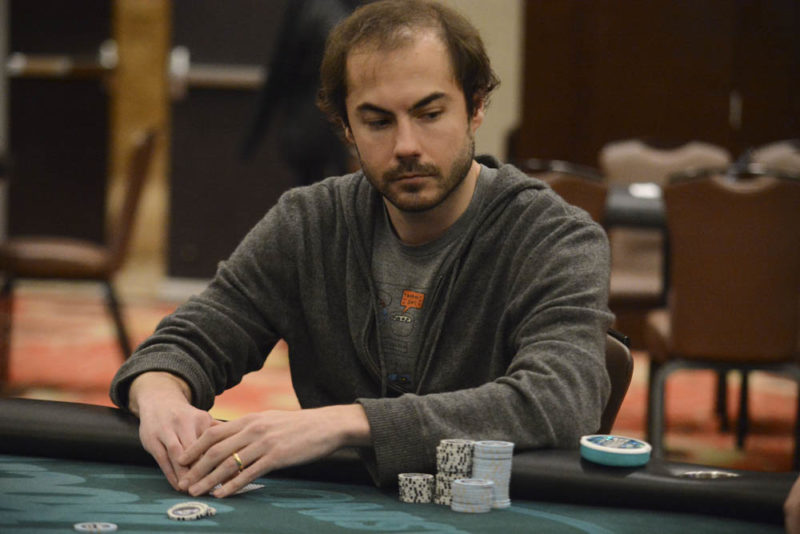Flip Poker
Let us consider the so-called “coin flip” confrontation of overcards versus a pocket pair in no-limit hold’em. Most players and even TV commentators call, say, 8-8 versus A-K “a coin flip.” While I’m not fussy about precise numbers — a thumbnail grab is usually as useful as exact odds to many significant figures — I think it’s misleading to imply that this is a true 50/50 proposition, and that those inclined to gamble would happily take either side of the action. In fact, the pocket pair, no matter which pocket pair, is always at least a 52-to-48 percent favorite over any two overcards. While that may be in the neighborhood of a coin flip (if you define neighborhood loosely enough), it’s not a neighborhood you’ll find profitable if you’re consistently on the wrong end of the odds.
Ways to flip poker luck into poker skill. Nov 22, 2016 3:00 AM George Epstein. Paying close attention to the poker game rather than watching the football game on the TV screen, the skilled. Gameflip is a marketplace and gaming hub trusted by millions of gamers. Shop for deals while you chill and improve your gaming skills. Flop Poker uses regular poker rules to make what is essentially a quick-and-easy table game out of a poker game - with a player supported pot of money to be won. As a bonus, the house will chip-in for a large jackpot if a player hits a good hand.

Does this mean you should always make a big move with pocket pairs, knowing that you have a measurable edge against overcards? Obviously not, since overcards aren’t the only sort of hand out there against you. There might also be overpairs, and if you run into a bigger pocket pair, you’re on the order of a 4-to-1 underdog, and facing an uphill climb.
But you do want to have in your arsenal the ability to make big bets with pocket pairs, so do these two things to minimize your exposure to overpairs. First, naturally, avoid making big moves with smaller pairs. Even pocket eights face six dominating pocket pairs; pocket deuces face twelve. The less headroom you leave in the deck, the better your chances are of getting called by the overcards you seek (or better still an underpair) and not the overpairs you fear. Second, save your big pocket pair moves for late position when there are fewer hands left to act, and therefore fewer chances of running into a dominating pair. Acting late also increases your chances of winning without a fight — never not a good thing.
If I play small pairs at all, I play them as a drawing hand, hoping to flop a set and trap other players for all their chips. Just because 4-4 is a theoretical favorite against some hypothetical A-K or A-Q, the hand doesn’t give me (or you) license to go nuts. Yet we see all kinds of players, especially those new to the game, getting terribly frisky with these hands — moving all-in under the gun with small pairs and hoping for the magical power of the “coin flip” to see them through to victory. This is hazardous in a cash game, where you can at least reload if it goes wrong. In tournaments, it’s suicide, unless you’re confident that everyone will fold — but then you’re on a pure steal, in which case it really doesn’t matter whether your cards are high or low, paired or unpaired, red, black, blue, silver, or green.
Pocket pairs, then, play best for big bets when they’re not early and not small. Otherwise, play them to hit a set, or even don’t play them at all.
Now let’s flip over to the other side of the confrontation and see how overcards perform.
One thing overcards have going for them is that they’re rarely badly dominated like pairs can be. The only time a hand like A-K is in serious trouble, for instance, is when it finds itself up against A-A or K-K, in which case the A-K figures to lose seven-to-nine times out of ten. But it’s unlikely that your opponent has one of these hands, especially since you hold an ace and a king yourself. Therefore, when you bet big with A-K, you can usually anticipate being no worse than a slight underdog against a call from a pocket pair. Against an A-x or two unpaired undercards, of course, you’re a big favorite.
This fact gives you a little room to get creative with your A-K holdings. Let’s say you’re playing in a no-limit game with $2 and $5 blinds, and three players have limped in before the action gets to you. You have $100 in your stack. (Why you’re so short-stacked — why you didn’t reload when you had the chance — is a subject for another time.) If you push all-in and get one caller, you’ll be betting $100 to win around $120. The dead-money overlay gives you proper odds in case you get called by a pocket pair from queens on down, plus extra equity from the times that no one cares to contest.

How To Thumb Flip Poker Coin

Of course, you have to know your foes. In today’s wild and wooly low buy-in no-limit games, people will make all sorts of — I don’t want to call them stupid, so let’s call them imaginative — plays, including calling big bets with improbable holdings (meaning, crap). Get two callers in this situation and you’re usually slightly worse than a 3-to-2 favorite to win. With the pot offering you a 2-to-1 return on your investment, you’re still on the right side of the odds — but you’ll nevertheless go broke two times out of five! It’s no fun to go broke, especially if the agony of defeat can put you on tilt and cause you to start hemorrhaging at the wallet.
So you have to know your foes. You have to know that your big raise is going to get either one caller or no callers (remembering that if they all fold, you don’t have to get lucky at all). Critically, you also have to know yourself: Can you make high-risk, high-reward moves, encounter adverse outcomes, and still stay on your game? If so, go ahead and play Big Slick strongly, confident that the hand is rarely in terrible shape to start. If not, goodness, go work on your tilt control! For there, coin flips notwithstanding, is where your success in poker really lies. ♠
Flip Poker
John Vorhaus is author of the Killer Poker series and co-author of Decide to Play Great Poker, plus many mystery novels including World Series of Murder, available exclusively on Kindle. He tweets for no apparent reason @TrueFactBarFact and secretly controls the world from johnvorhaus.com.

Flip Poker Academy
